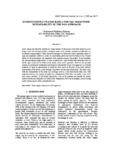Interventions in water supply for the urban poor sustainability of the NGO-approach

View/Open
Date
2004Publisher
BRAC UniversityAuthor
Rahman, Mohammed MahbuburMetadata
Show full item recordAbstract
Kofee Annan described the inability of a huge number of urban poor in the third world to access proper water and sewerage facilities, leading to many socio-economic and physical difficulties, as an affront to human dignity. Water should be managed as a financially sound commodity subject to legal and regulatory controls to ensure its conservation, protection and well-balanced use. Despite efforts by the governments, the magnitude of the problem remains unassailable. In this backdrop, the non-government organisations in some countries have come forward with innovative ideas to fill the gaps created by the failure of the public sector service providers. However, the question remains of ensuring the institutional and financial sustainability of any such approach, as it should primarily be upon the governments to satisfy the basic needs of the poor, if necessary with the participation of the private sector through a legislative and functional framework. This paper deals with the sustainability of the water and sewerage services in the third world urban areas with particular reference to a model developed by a Bangladeshi NGO where the public sector is the only service provider. It will briefly present the scale of the problem and identify the parties involved before presenting the case study on the Bangladeshi NGO and its program, and discussing on the various aspects of the sustainability issue.
